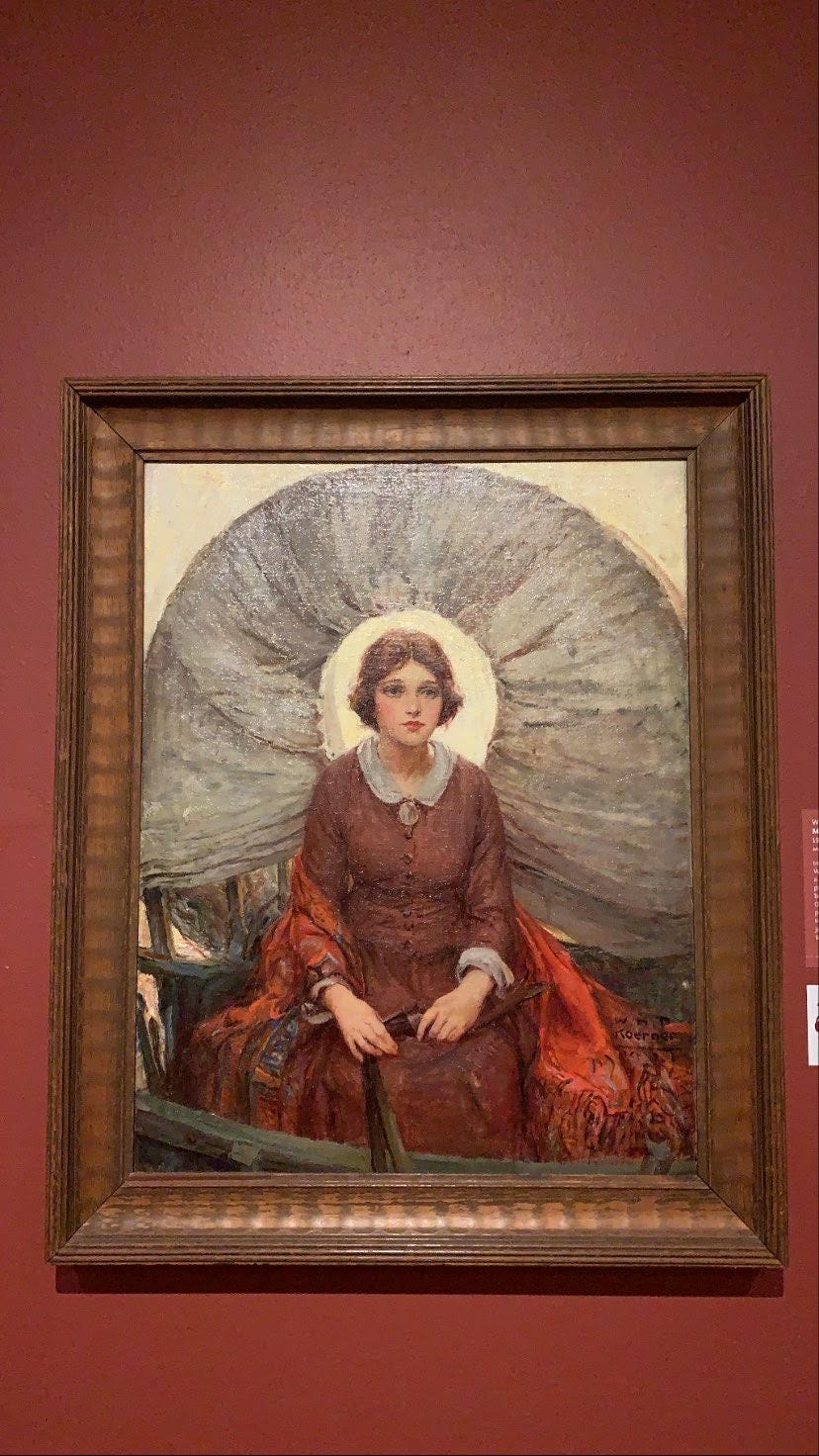In the days leading up to my wedding, I attempted to convince myself to take my fiancé’s last name. I thought of my friends in primary school, giddily styling themselves in notebooks and journals as “Mrs.”, with sketches of opulent wedding gowns in the margins. I thought of my youth group leaders sharing the joy they felt as they accepted their “first priority” as wives and mothers, how fulfilled and secure they seemed.1 As I contemplated my decision, I remembered Sunday School lessons where I learned, in various iterations, that no matter what I might achieve outside the domestic sphere, my highest priority remained my family, and my highest calling that of a “marriage partner and nurturer.”2
During my childhood, I knew few women who retained their maiden names. Despite their scarcity, the other women whispered about them at church when they sat on pews in business slacks. The word “feminist” echoed sharply in the sacrament hall. The whispers intensified whenever anyone spoke of ordaining women to the priesthood. Between hushed conversations hastily concluded in corridors and newspaper headlines featuring women lining the streets of Temple Square, I quickly understood that these women—women who wore pants to church, spoke of equality, and kept their maiden names—weren’t women whose example my church leaders wanted me to follow.
I should have known in my youth I would never fit the traditional Latter-day Saint mold. At church, I eventually refused to participate in the now-retired Personal Progress program when I failed to contain my resentment that the girls learned to test the temperature of a baby’s bathwater while the boys learned survival skills. In high school, I wrote essays on why dress codes compromise girls’ education and sexualize female bodies. As an adult, I wept after church when my bishop appointed a career specialist for the young men but created no such calling to serve the young women. I perched on the edge of my bed, wondering why my religion and culture seemed so uninterested in investing in the future of women, wondering why God seemed to care about women so much less than men.
Yet, as I sat in front of my computer that week before my wedding, staring at the paperwork required to take my husband’s last name, I felt surprised when I failed to type even a single word. My surprise rapidly turned to distress—what was wrong with me?
In my distress, I reached out to a friend who had recently become engaged. I confided in her that I felt unable to take my husband’s last name and that I worried I might lose my sense of self. “Oh!” she replied, “Keeping my last name never occurred to me. I think there’s a beautiful symbolism in taking your husband’s last name.” My distress shifted into shame, which fermented into grief and slowly decayed into bitterness. What was wrong with me? Why did I fail to see the “beautiful symbolism”? Why did I feel such a fierce need to preserve my sense of self, my identity? If I couldn’t bring myself to fit the image of the perfect woman, would I fail my calling as a wife? Would I be the one whispered about in clipped tones? I felt less-than—less than a woman, less than a wife, less than a Mormon. I spent months self-reflecting, attempting to convince myself to do the normal thing, but ultimately, I simply failed to do what was expected of me.
While I felt social pressure for failing to follow cultural norms, most women in Utah face more serious forms of discrimination. It’s no secret that Utah falls far behind the rest of the United States in terms of women’s equality. A study conducted by WalletHub placed Utah dead last in the nation across 17 indicators of women’s equality, including employment rates, educational disparity, health, and political representation.3 A report on civil rights and the gender wage gap in Utah by the United States Commission on Civil Rights found that, on average, Utah women earn 70 cents per dollar earned by men, 10 cents lower than the national average. The wage gap for women exists in both male and female-dominated occupations. School teachers, a female-dominated occupation in Utah, demonstrate this point well. Female school teachers make up 88% of Utah’s workforce and earn only 86% of what male school teachers take home.4 Reduced earnings mean smaller retirement savings, less financial security, and reduced quality of life.5 Women of color face significantly more opposition than white women. In the state of Utah, Black women earn 52 cents for every dollar a white man earns, and Latina women earn only 48 cents per dollar.6 According to a study conducted by the YWCA in 2019, more women of color work outside the home than white women but still have less access to adequate health insurance than their white colleagues.7 At our current pace, Utah will not close the wage gap until 2106.8
While a myriad of factors contributes to Utah’s equality rating, Utah’s religious culture certainly influences expectations for Utah’s female population, placing significant emphasis on women’s domestic contributions.9 While Latter-day Saints, among other religious groups, cherish women as wives and mothers, this “special treatment” allows sexism to remain unchecked. Dr. Susan Madsen, professor of leadership and ethics at Utah Valley University, argues that this attitude of cherishing women “reinforces patriarchal norms…which ascribe less value to women.”10 Indeed, women’s domestic aspirations often act as a double-edged sword in the workplace. Working women often face a “motherhood penalty.” When a woman interrupts her career to focus on caregiving, research indicates that non-mother female and male co-workers perceive her as less competent, thus lowering her recommended salary and likelihood of promotion.11 In this sense, Utah mothers are punished for their motherhood. In addition to barriers to equality in the workplace, Utah women face other significant challenges. Utah’s girls score two points lower on math exams than boys their same age, indicating educational disparity.12 Utah’s women also face significant challenges surrounding mental health. On average, women in Utah report nearly five days per week in which they categorize their mental health as “not good.” Utah’s female suicide rate ranks 45th in the nation, sitting at 10.6 suicides per 100,000 women.13 While the factors contributing to these statistics remain diverse and complex, Utah fails to create an environment that treats women fairly.
So, what do we do? How can we improve the lives of women across the state? The Utah Women and Leadership Project makes several salient recommendations, including electing a woman for one of Utah’s two U.S. Senate seats, reducing disparity in math scores for Utah’s schoolgirls, and narrowing the pay gap.14 While many of these changes will require substantial institutional and systemic shifts, I argue for a small individual change that will help pave the way for larger, sweeping overhauls—talk about your lived experience. In the months that I agonized over my maiden name, I worried most about how other women would perceive me. In talking openly about my lived experience, I hope to mitigate the shame that I felt for others and offer my own experience so that other women might feel less alone. Women, talk about your salaries to bring attention to the gender pay wage gap. Mothers, talk about the happiness you find in your children but please, try not to fear talking about the hardships, too. The easiest thing we can do to help lift other women is to acknowledge that being a woman in Utah is an uphill battle. No matter one’s background or satisfaction with their marital status or motherhood, the notion that women’s value derives directly from their ability to serve men as wives and mothers pits women against each other, stifles diversity, and prevents Utah women from achieving equality. Talking about our experiences helps us foster a community of inclusion based on shared experience and helps us stop the division inequality forces upon us.
As I have continued to develop my understanding of womanhood, I decided to keep my maiden name. Some women may feel as I do—an indomitable desire to preserve their sense of self by rejecting tradition and retaining their maiden names. Others desire to pursue higher education, entrepreneurship, or work outside the home. Others desire to remain home with their children and maintain a more traditional lifestyle. Whatever a woman’s desire, she possesses a right to live her life free from discrimination. She deserves equal access to all the opportunities Utah offers. I dream of a Utah where women freely discuss their own lived experiences—a Utah where women feel free to live as they please. I dream of a Utah where women love who they love without fear, where women feel accepted for who they are, as they are. I long for a Utah where girls daydream about their weddings and their educations. I believe in an equal Utah and in Utahns’ ability to make an equal Utah our collective reality.
Ann Reese, “Being a Wife,” Ensign, September 1984.
Ibid.
Adam McCann, “Best & Worst States for Women’s Equality.” WalletHub. August 23, 2021.
United States Commission on Civil Rights, “Civil Rights and the Gender Wage Gap in Utah” (July 2020), 5.
Ibid., 6.
Ibid., 16.
YWMCA, “The Well-Being of Women in Utah” (2019), 2.
United States Commission on Civil Rights, “Civil Rights and the Gender Wage Gap in Utah” (July 2020), 5.
Susan R. Madsen and Greg P. Madsen., “Women’s Equality in Utah: Why Utah Is Ranked as the Worst State, and What Can Be Done.” Utah Women and Leadership Project White Paper, No. 4 (December 2, 2021), 3.
Ibid., 30.
United States Commission on Civil Rights, “Civil Rights and the Gender Wage Gap in Utah” (July 2020), 18.
Susan R. Madsen and Greg P. Madsen., “Women’s Equality in Utah: Why Utah Is Ranked as the Worst State, and What Can Be Done.” Utah Women and Leadership Project White Paper, No. 4 (December 2, 2021), 15.
YWMCA, “The Well-Being of Women in Utah” (2019), 5.
Susan R. Madsen and Greg P. Madsen., “Women’s Equality in Utah: Why Utah Is Ranked as the Worst State, and What Can Be Done.” Utah Women and Leadership Project White Paper, No. 4 (December 2, 2021), 19.






Hello Tara, I want to thank you for sharing your experience and thoughts. As someone who grew up Mormon and was raised by a single mother who was a professor at BYU, I have witnessed first hand the wage gap that existed for my mother across her career as well as discrimination in a variety of ways.
I respect your decisions and determination to retain a sense of identity and deciding what works best for you. If I had the courage you have I might have remained a member of the Mormon church, but as you say the amount of pressure and judgment associated with just being yourself can take a toll. As a therapist by profession I talk with many women / people who are distraught and yes even suicidal because they cannot reconcile their sense of self with the expectations they feel they must meet to be accepted.
I believe your words will help encourage many women to live true to themselves and I believe that to be a contribution to the world. No one should live feeling badly about themselves. Thank you for your article. Tamara Vitela